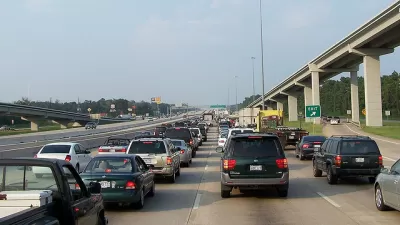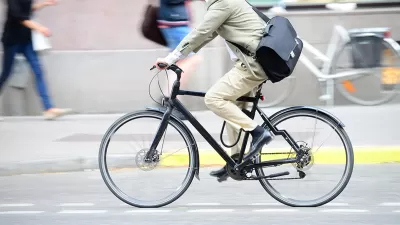Forbes just came up with another of its “Most X City” surveys. This week, it listed the most stressful cities (http://www.forbes.com/2009/08/20/stress-unemployment-homes-lifestyle-rea... ). Nearly all of Forbes’ criteria, however, are silly in one respect or another.
Forbes just came up with another of its "Most X City" surveys. This week, it listed the most stressful cities (http://www.forbes.com/2009/08/20/stress-unemployment-homes-lifestyle-rea... ). Nearly all of Forbes' criteria, however, are silly in one respect or another.
For example, Forbes considers population density an indication of
high stress. But since low-density cities are more
automobile-dependent, low density can create stress: constant long-distance driving is (at least to me) a source of
stress, while being able to walk and use public transit might reduce
stress for some people.
To Forbes, sunny days equal low stress. But while living in Florida,
I was often in pain from the mild sunburns that occurred when I went
out for a few minutes without sunscreen. Even after I started reducing
this problem through sunscreen, I came to realize that having to
constantly worry about skin cancer and whether I have slathered on
enough sunscreen is highly stressful. Thus, the Florida sun is a stress
inducer (at least for me) and not a stress reducer.
Forbes also lists unemployment and declining home prices as indicia
of stress. To be sure, these things are problems if you are affected by
them. But if you are employed, why would you be more stressed if
unemployment is 9 percent than if it is 7 percent? To be sure, in
extreme cases (i.e. where the economy is so bad that most employed
people are worried about losing your job) high unemployment may stress
out the employed. But otherwise, the pain of others will not affect
your own well-being in this regard.
Finally, Forbes lists low air quality as stressful. But since most
people have no idea how their city's air quality compares to other
cities or to their ideal, they cannot possibly suffer stress from bad air.
So how could stress be measured? One stress generator is physical
illness- and some of the factors cited by Forbes are surrogates for
physical illness. For example, it suggests that air quality and low
sunshine correlate with colds and minor respiratory ailments. But if it
was possible to measure the frequency of such low-level illness, surely that
would be a better way to measure stress.
Also, perceptions affect subjective well-being. So if survey
evidence existed as to people's perceptions of air quality, such
evidence would show whether some cities were more stressful than
others. For example, if a survey asked "Are you concerned with air
pollution in your city?" and Pittsburgh residents were more concerned
than Austin residents, surely Pittsburgh would be more stressful than
Austin in this regard- even if objectively, there was no evidence of a
difference between the two city.
Similarly, perceptions of crime affect subjective well-being. For
example, imagine a multi-city survey asking: "How safe do you feel
walking near your residence at night?" Surely, a place where people
felt unsafe is more stressful than one where people feel safe-
regardless of the objective differences (or lack thereof) between the
two cities. (Incidentally, the Forbes study omitted crime- perhaps
because Forbes' other data consistently favor newer Sun Belt cities,
and a focus on crime might dilute that story).
Of course, I suspect little public data exists as to these issues-
which is why there is no easy way to decide whether Jacksonville is
more stressful than Des Moines.

Study: Maui’s Plan to Convert Vacation Rentals to Long-Term Housing Could Cause Nearly $1 Billion Economic Loss
The plan would reduce visitor accommodation by 25,% resulting in 1,900 jobs lost.

North Texas Transit Leaders Tout Benefits of TOD for Growing Region
At a summit focused on transit-oriented development, policymakers discussed how North Texas’ expanded light rail system can serve as a tool for economic growth.

Using Old Oil and Gas Wells for Green Energy Storage
Penn State researchers have found that repurposing abandoned oil and gas wells for geothermal-assisted compressed-air energy storage can boost efficiency, reduce environmental risks, and support clean energy and job transitions.

Private Donations Propel Early Restoration of Palisades Playground
Los Angeles has secured over $1.3 million in private funding to restore the Pacific Palisades playground months ahead of schedule, creating a modern, accessible space that supports community healing after recent wildfires.

From Blight to Benefit: Early Results From California’s Equitable Cleanup Program
The Equitable Community Revitalization Grant (ECRG) program is reshaping brownfield redevelopment by prioritizing projects in low-income and environmental justice communities, emphasizing equity, transparency, and community benefits.

Planting Relief: Tackling Las Vegas Heat One Tree at a Time
Nevada Plants, a Las Vegas-based nonprofit, is combating the city’s extreme urban heat by giving away trees to residents in underserved neighborhoods, promoting shade, sustainability, and community health.
Urban Design for Planners 1: Software Tools
This six-course series explores essential urban design concepts using open source software and equips planners with the tools they need to participate fully in the urban design process.
Planning for Universal Design
Learn the tools for implementing Universal Design in planning regulations.
Ascent Environmental
Borough of Carlisle
Institute for Housing and Urban Development Studies (IHS)
City of Grandview
Harvard GSD Executive Education
Toledo-Lucas County Plan Commissions
Salt Lake City
NYU Wagner Graduate School of Public Service





























